
John Brumwell Mayall was an English blues and rock musician, songwriter and producer. In the 1960s, he formed John Mayall & the Bluesbreakers, a band that has counted among its members some of the most famous blues and blues rock musicians. A singer, guitarist, harmonica player, and keyboardist, he had a career that spanned nearly seven decades, remaining an active musician until his death aged 90. Mayall has often been referred to as the "godfather of the British blues", and was inducted into the Rock and Roll Hall of Fame in the musical influence category in 2024.
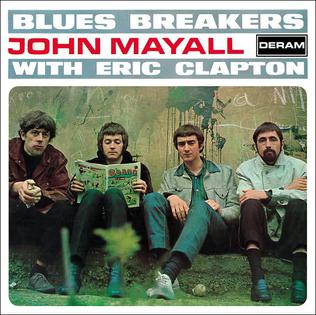
Blues Breakers, colloquially known as The Beano Album, is the debut studio album by the English blues rock band John Mayall & the Bluesbreakers, originally credited to John Mayall with Eric Clapton. Produced by Mike Vernon and released in 1966 by Decca Records (UK) and London Records (US), it pioneered a guitar-dominated blues-rock sound.
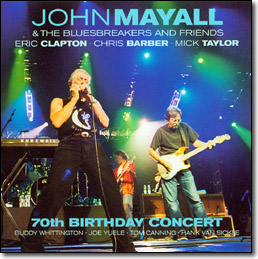
70th Birthday Concert is a live electric blues video recording of John Mayall & the Bluesbreakers to celebrate Mayall's 70th Birthday. Recorded in Liverpool, England on 19 July 2003, the concert was notable as it featured Eric Clapton as a guest, so marked the first time he and Mayall had performed together in almost 40 years, if one discounts Clapton guesting on Mayall's Back to the Roots. The set also features Mick Taylor and Chris Barber.
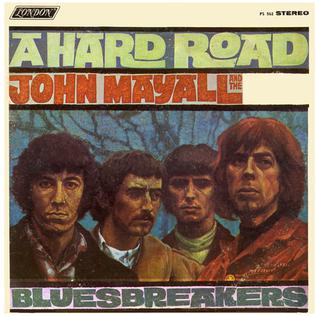
A Hard Road is the third album recorded by John Mayall & the Bluesbreakers, released in 1967. It features Peter Green on lead guitar, John McVie on bass, Aynsley Dunbar on drums and John Almond on saxophone. Tracks 5, 7 and 13 feature the horn section of Alan Skidmore and Ray Warleigh. Peter Green sings lead vocals on "You Don't Love Me" and "The Same Way".

Chicken Shack are a British blues band, founded in the mid-1960s by Stan Webb, Andy Silvester, and Alan Morley (drums), who were later joined by Christine Perfect in 1967. Chicken Shack has performed with various line-ups, Stan Webb being the only constant member.

Crusade is the fourth album and third studio album by the British blues rock band John Mayall & the Bluesbreakers, released on 1 September 1967 on Decca Records. It was the follow-up to A Hard Road, also released in 1967. As with their two previous albums, Crusade was produced by Mike Vernon. The album was the first recordings of the then-18-year-old guitarist Mick Taylor.
Keith "Keef" Hartley was an English drummer and bandleader. He fronted his own band, known as the Keef Hartley Band or Keef Hartley's Big Band, and played at Woodstock. He was later a member of Dog Soldier, and variously worked with Rory Storm, the Artwoods and John Mayall.
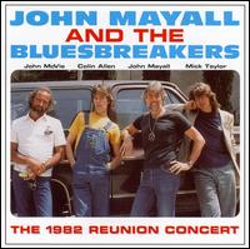
The 1982 Reunion Concert is a live album from a concert by British blues musician John Mayall. His sidemen are Mick Taylor on guitar, John McVie on bass and Colin Allen on drums. The concert took place at the Wax Museum, Washington DC, on 17 June 1982. It was released in 1994 by Repertoire Records as a CD credited to John Mayall and the Bluesbreakers.
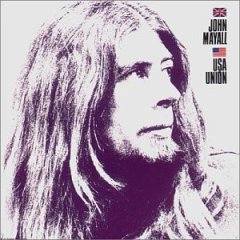
USA Union is a 1970 album by blues musician John Mayall, featuring Harvey Mandel on guitar, Larry Taylor on bass and Don "Sugarcane" Harris on violin. The album was recorded on July 27 & 28th, 1970 at Larrabee Studios in LA and released by Polydor later in the same year John Mayall - Discography.

William "Billy Boy" Arnold is an American blues harmonica player, singer and songwriter. Arnold is a self-taught harmonica player and has worked with blues legends such as Bo Diddley, Johnny Shines, Otis Rush, Earl Hooker, Howlin' Wolf, Muddy Waters and others.

Halfbreed is the debut album by the Keef Hartley Band. The band was formed when Keef Hartley left John Mayall's band after touring and playing on seven albums, including being the only performer besides Mayall on The Blues Alone. Halfbreed includes two spoken passages featuring Mayall, as well as several notable British jazz-rock players.

Back to the Roots is a 1971 double album by John Mayall released on Polydor. Recording sessions took place both in California and London where Mayall invited some former members of his band, notably guitarists Eric Clapton and Mick Taylor. At the end of the 1980s Mayall remixed some tracks and issued them along with some of the older material as Archives to Eighties. An expanded two-CD version of Back to the Roots now includes both the original and later remixed versions of the tracks.

Ten Years Are Gone is a double album by John Mayall. Record one was recorded at Sunset Sound, Los Angeles, and record two was recorded in concert at the New York Academy of Music. The album was released in 1973. Like its predecessors Jazz Blues Fusion and Moving On, it features Freddy Robinson on guitar and Blue Mitchell on trumpet.

Sonny & Brownie is an album by the blues musicians Sonny Terry and Brownie McGhee. It was recorded at the Paramount Recording Studios in 1973, and re-released in 1988 with digital remastering by Rudy Van Gelder at the Van Gelder Recording Studio.

Bare Wires is a studio album by John Mayall's Bluesbreakers, featuring Mick Taylor on guitar, Chris Mercer and Dick Heckstall-Smith on saxophones, Jon Hiseman on drums, Henry Lowther on cornet and violin, and Tony Reeves on bass. It was released in 1968 on Decca Records. The album was the last John Mayall studio album to feature the name "Bluesbreakers". The album was also Mayall's first successful U.S. album reaching #59 on the Billboard 200.

Looking Back is the seventh album released by John Mayall in August 1969 by Decca Records. The album features songs by both John Mayall's Bluesbreakers and John Mayall solo work. The album reached No. 79 on the Billboard 200. Confusingly, there are two different albums with the title "Looking Back": a Decca UK release as a single album and a Decca Germany release as a double album. Later issues on CD would use the Deram label.
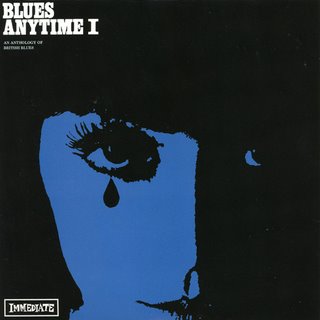
Blues Anytime: An Anthology of British Blues is a series of compilation albums featuring tracks from various British blues artists. Three volumes were released by Immediate Records in 1968, followed by Blues Leftovers in 1969.
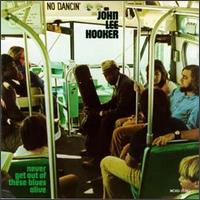
Never Get Out of These Blues Alive is a studio album by American blues musician John Lee Hooker, released in 1972 by ABC Records and recorded on September 28–29, 1971.

Smokin' Blues is a live album by blues guitarist John Mayall. This collection of songs come from a set of shows John Mayall completed in Frankfurt, Germany and has been released through Secret Records. Tracks 1-4 were recorded on 2 May 1972 and tracks 5-12 were recorded on 17 May 1973. The main difference between these two gigs is the tenor saxophone player, Clifford Solomon in 1972 and Red Holloway in 1973.

Thru the Years is a compilation album of music by John Mayall released in October 1971 by Decca Records in the U.K. and London Records in the U.S.A. The album was the second compilation to be issued by Decca/London with Mayall's blessing, although his contract with them had ceased. It features a mixture of previously unissued songs or non-album tracks that had only been released as singles.



















